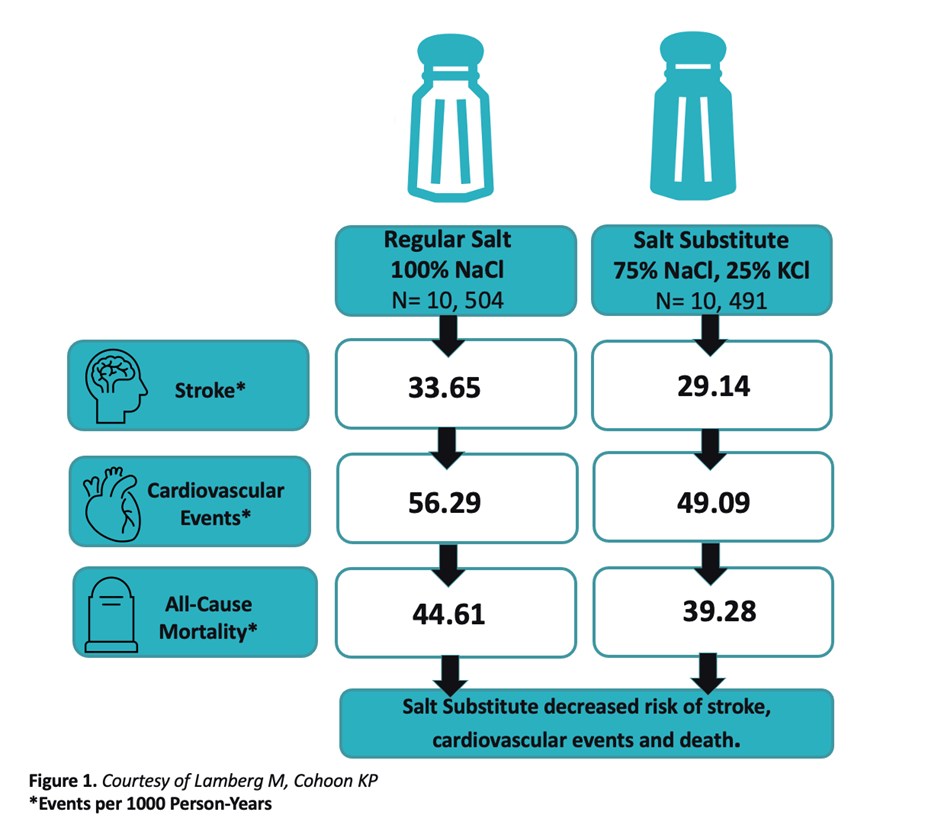Salt Less, Live Longer: Results of the Salt Substitute and Stroke Study
Quick Takes
- In patients with a history of stroke or who were 60 years of age or older with hypertension, salt substitute was found to reduce risk of stroke, major cardiovascular events, and death.
- While salt substitute was not found to cause increase in clinical hyperkalemia, patients who had chronic kidney disease, were taking a potassium-sparing diuretic, or receiving potassium supplementation were excluded from this study. Additionally, surveillance of potassium levels was not performed throughout the study.
Multiple studies have demonstrated that high dietary sodium and low dietary potassium intake are associated with hypertension and increased risk of both cardiovascular disease and premature death.1-3 However, until recently, the effect of replacing regular salt (100% sodium chloride) with salt substitutes (75% sodium chloride, 25% potassium chloride) on cardiovascular outcomes had not been studied.
The Salt Substitute and Stroke Study (SSaSS)1 is an unblinded, cluster-randomized trial that included 20,995 participants from 600 rural Chinese villages who had a history of stroke or were 60 years or older with a diagnosis of hypertension. These participants were randomized in a 1:1 ratio by village to salt substitute or regular salt which were to be used for all cooking and food preservation. The study found that the rate of stroke was significantly decreased in the salt substitute group compared to the regular salt group (29.4 events vs. 33.65 events per 100 person-years).1 Additionally, salt substitute significantly reduced major adverse cardiovascular events (49.1 events vs. 56.3 events per 1000 person-years) and all-cause mortality (39.3 events vs. 44.5 events per 1000 person-years).1 Finally, there was not a significant increase in serious adverse events from hyperkalemia between the two groups, a theoretical risk that has previously caused reluctancy among patients and providers.
The findings in this study are congruent with the literature that shows sodium reduction and potassium supplementation lower blood pressure. Salt substitute, which simultaneously does both, offers an accessible, cost-effective option for the treatment of hypertension and therefore, the reduction of stroke, cardiovascular events, and death.
References
- Neal B, Wu Y, Feng X, et al. Effect of salt substitution on cardiovascular events and death. N Engl J Med 2021;385:1067-77.
- Aburto NJ, Hanson S, Gutierrez H, Hooper L, Elliott P, Cappuccio FP. Effect of increased potassium intake on cardiovascular risk factors and disease: systematic review and meta-analyses. BMJ 2013;Apr 3:[Epub ahead of print].
- Cogswell ME, Mugavero K, Bowman BA, Frieden TR. Dietary sodium and cardiovascular disease risk—measurement matters. N Engl J Med 2016;375:580-86.
Clinical Topics: Prevention, Nonstatins, Diet, Hypertension, Vascular Medicine
Keywords: ESC Congress, ESC21, Potassium Chloride, Potassium, Dietary, Sodium Chloride, Antihypertensive Agents, Sodium, Sodium, Dietary, Cardiovascular Diseases, Blood Pressure, Hyperkalemia, Chlorides, Mortality, Premature, Cost-Benefit Analysis, Sodium Chloride, Dietary, Hypertension, Diet, Diuretics, Potassium Sparing, Stroke, Renal Insufficiency, Chronic, Cooking, Asian Continental Ancestry Group, Potassium, Food Preservation, Dietary Supplements
< Back to Listings


